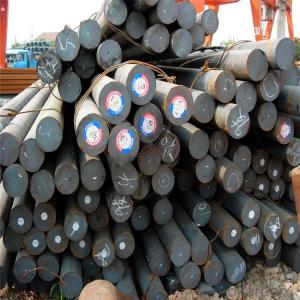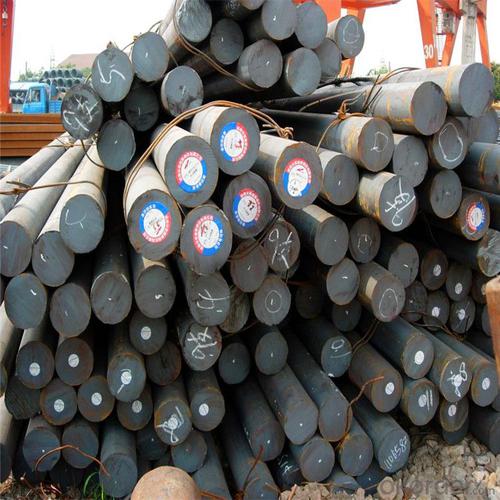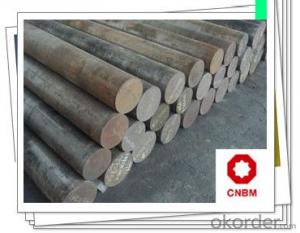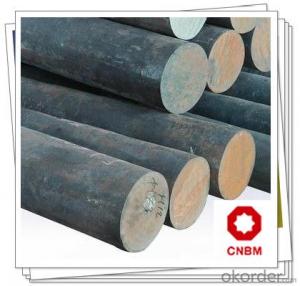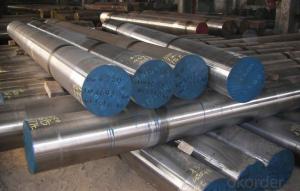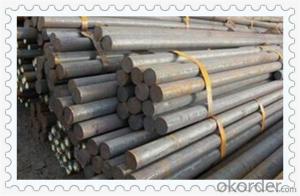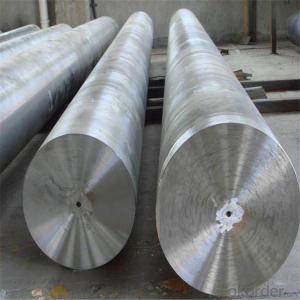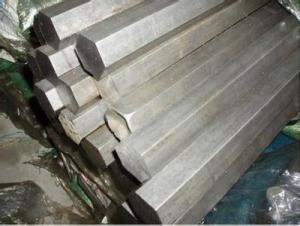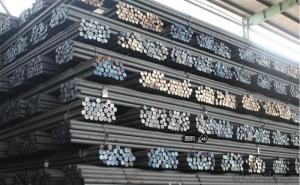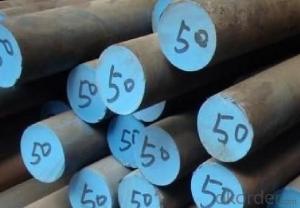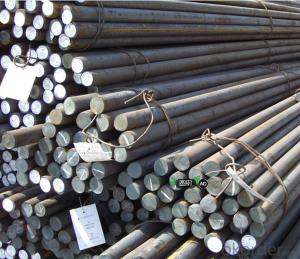Promotional All Sizes S40C Forged Steel Bar
- Loading Port:
- Tianjin
- Payment Terms:
- TT OR LC
- Min Order Qty:
- 100 m.t.
- Supply Capability:
- 500000 m.t./month
OKorder Service Pledge
OKorder Financial Service
You Might Also Like
Specification
Promotional All Sizes S40C Forged Steel Bar
Product Description of Promotional All Sizes S40C Forged Steel Bar
1. Steel grade: SAE1040, 40#, C40, S40C
2. Length: 6M-12M
3. Diameter: 16mm-300mm
4. Product range: round bar, flat bar, square bar
5. Technique: Hot rolled, forged, cold drawn
Specification of Promotional All Sizes S40C Forged Steel Bar
Material | S40C | Round bar | Dia(mm) | 16-300mm |
Process | EAF + LF + VD + Forged + Heat Treatment (optional) | Length (mm) | Max 12m | |
Heat treatment | Normalized / Annealed / Quenched / tempered | Flat bar | Thickness(mm) | 8-500mm |
Delivery condition | Hot forged +Rough machined (black surface after Q/T)+ Turned (optional) | Width(mm) | 70-200mm | |
Test | Ultrasonic test according to SEP 1921-84 D/d | Length (mm) | Max 12m |
Chemical Composition of Promotional All Sizes S40C Forged Steel Bar
C | Si | Mn | Cr | Ni | Cu |
0.37~0.43 | 0.17~0.37 | 0.35~0.65 | ≤0.25 | ≤0.30 | ≤0.25 |
Photo Show of Promotional All Sizes S40C Forged Steel Bar
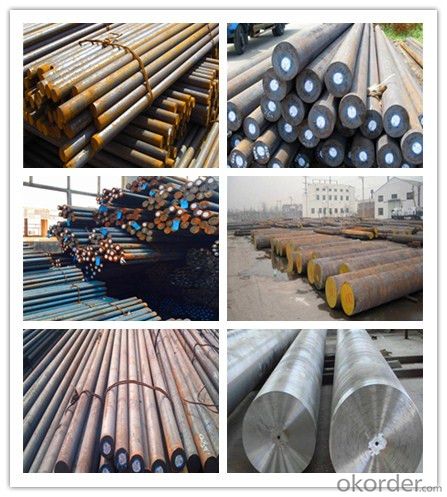
Packing and Delivery:
Packing in bundle package, or as customer's requirements.
Delivery Detail: 45 days after receiving the deposit.
Usage and Applications of Promotional All Sizes S40C Forged Steel Bar
1. Steel round bar is used in a large number of architectural and engineering structures. Or it can be used in construction of plants for the production of steel house frames, high-voltage transmission towers, bridges, vehicles, boilers, containers, ships, etc.
2. And we can use this kind of product on the performance of the mechanical parts if the demand is not very high.
3. Some special material steel round bar can be used for main shaft of steamer, hummer shank, with big section and supper force.
Company Information
CNBM International Corporation is the most important trading platform of CNBM group.
Whith its advantages, CNBM International are mainly concentrate on Cement, Glass, Iron and Steel, Ceramics industries and devotes herself for supplying high qulity series of refractories as well as technical consultancies and logistics solutions.


F A Q
1, Your advantages?
professional products inquiry, products knowledge train (for agents), smooth goods delivery, excellent customer solution proposale
2, Test & Certificate?
SGS test is available, customer inspection before shipping is welcome, third party inspection is no problem
3, Factory or Trading Company?
CNBM is a trading company but we have so many protocol factories and CNBM works as a trading department of these factories. Also CNBM is the holding company of many factories.
4, Payment Terms?
30% TT as deposit and 70% before delivery.
Irrevocable L/C at sight.
5, Trading Terms?
EXW, FOB, CIF, FFR, CNF
6, After-sale Service?
CNBM provides the services and support you need for every step of our cooperation. We're the business partner you can trust.
For any problem, please kindly contact us at any your convenient time.
We'll reply you in our first priority within 24 hours.
- Q: Can steel round bars be bent or formed into shapes?
- Steel round bars possess the ability to undergo bending or shaping into different forms. Due to its exceptional strength and durability, steel is widely recognized as a versatile material suitable for various purposes. To achieve the desired shapes, steel round bars can be bent or formed using diverse techniques such as heating, hammering, or utilizing specialized machinery like hydraulic presses or roll benders. These methods enable the steel bars to be molded into curves, angles, or specific configurations in order to meet the desired requirements. However, it is important to acknowledge that the flexibility of a steel round bar to undergo bending or shaping is contingent upon factors including its diameter, type of steel, and the specific technique employed for bending or forming.
- Q: Can steel round bars be used in the production of HVAC equipment?
- Certainly, HVAC equipment production can indeed make use of steel round bars. In the manufacturing of diverse HVAC components such as air ducts, frames, supports, brackets, and other structural elements, steel round bars find extensive application. Steel is widely preferred in HVAC equipment owing to its exceptional strength, durability, and resistance to corrosion. Its high tensile strength ensures its suitability in handling the mechanical stresses and loads encountered by HVAC systems. Furthermore, steel can endure high temperatures and is non-combustible, rendering it a secure material for HVAC purposes. On the whole, the reliability, longevity, and performance of steel round bars make them extensively employed in HVAC equipment production.
- Q: Can steel round bars be used in the production of agricultural machinery?
- Indeed, the utilization of steel round bars is applicable in the fabrication process of agricultural machinery. Owing to their robustness, longevity, and adaptability, steel round bars are frequently employed in the creation of diverse agricultural machinery elements and constituents. These bars serve as ideal materials for constructing pivotal parts like axles, shafts, gears, and brackets, which are indispensable for the smooth functioning of agricultural machinery. It is worth noting that steel round bars can be effortlessly machined and welded to meet precise design prerequisites, rendering them an optimal selection for manufacturers involved in agricultural machinery production.
- Q: Can steel round bars be used in the manufacturing of consumer goods?
- Consumer goods manufacturing can make use of steel round bars. Steel is a durable and versatile material that finds wide application across industries, including the production of consumer goods. Steel round bars can be molded, cut, and shaped into various components or parts that are required for items like furniture, appliances, tools, and machinery. The strength and resilience of steel make it a perfect choice for consumer goods that demand robust and long-lasting materials. Moreover, steel can be easily customized and finished with coatings or treatments to enhance its appearance or protect it from corrosion, thereby making it even more suitable for use in consumer goods. In summary, the usage of steel round bars is common in consumer goods manufacturing due to their dependable nature, versatility, and ability to provide the desired quality and functionality.
- Q: How do steel round bars compare to other types of steel products?
- Steel round bars have several advantages over other types of steel products. Firstly, their cylindrical shape makes them highly versatile and easy to work with, allowing for various applications in construction, manufacturing, and engineering. Secondly, round bars have superior strength and durability, making them ideal for load-bearing structures and heavy-duty machinery. Additionally, their uniformity and smooth surface facilitate precision machining and fabrication processes. Lastly, steel round bars offer excellent resistance to corrosion and wear, ensuring a longer lifespan compared to other steel products. Overall, their unique properties and versatility make steel round bars a preferred choice for many industries.
- Q: What is the maximum temperature a steel round bar can withstand?
- The maximum temperature that a steel round bar can endure relies on various factors, including the particular type of steel, its composition, and the intended purpose. In general, most commonly used steel grades have an upper temperature limit of approximately 1,200 to 1,400 degrees Fahrenheit (650 to 760 degrees Celsius). However, certain stainless steels possess the ability to withstand higher temperatures, reaching up to 2,200 degrees Fahrenheit (1,200 degrees Celsius). Moreover, specialized heat-resistant alloys like Inconel or Hastelloy can withstand even greater temperatures, up to 2,500 degrees Fahrenheit (1,370 degrees Celsius) or beyond. To ensure the safe and efficient utilization of a specific steel round bar, it is essential to consult the manufacturer's specifications or conduct comprehensive research in order to ascertain its precise maximum temperature limit.
- Q: Can steel round bars be used for making gates?
- Yes, steel round bars can be used for making gates. Steel round bars are a popular choice for making gates due to their strength, durability, and versatility. They can be easily welded together to create the desired gate design and can withstand heavy loads and impacts. Additionally, steel round bars can be galvanized or coated to protect against rust and corrosion, ensuring the longevity of the gate. Overall, steel round bars are a suitable material for gate construction and are commonly used in residential, commercial, and industrial applications.
- Q: What is the difference between a solid and a hollow steel round bar?
- The main difference between a solid and a hollow steel round bar lies in their construction. A solid steel round bar is made entirely of solid steel material throughout its entire length. On the other hand, a hollow steel round bar has a hollow center, creating a tube-like structure. This design reduces the weight of the bar while maintaining its strength. Solid round bars are often used when high strength and durability are required, while hollow round bars are commonly used in applications where weight reduction is a priority, such as in construction or engineering projects.
- Q: Can steel round bars be plated or coated?
- Yes, steel round bars can be plated or coated. Plating or coating is a common practice used to enhance the appearance, durability, and corrosion resistance of steel round bars. The plating or coating process involves applying a layer of another material onto the surface of the steel round bars. This can be done through various methods such as electroplating, hot-dip galvanizing, powder coating, or painting. The chosen plating or coating material depends on the specific requirements and desired properties of the steel round bars. For example, zinc plating is commonly used to provide corrosion resistance, while chrome plating can enhance the aesthetic appeal. Overall, plating or coating steel round bars can significantly improve their performance and extend their lifespan.
- Q: What are the different bending methods for steel round bars?
- Different bending methods can be used for steel round bars, depending on the desired outcome and specific application. Some of the commonly employed methods for bending steel round bars include: 1. Cold Bending: Steel round bars are bent at room temperature without the application of heat. Specialized bending machines or tools are used to exert force on the bar and achieve the desired shape. 2. Heat Bending: The steel round bar is heated to a specific temperature to increase its malleability, making it easier to bend. Specialized tools or fixtures are then used to bend the heated bar. Heat bending is ideal for intricate or precise bends that cannot be achieved through cold bending alone. 3. Induction Bending: This process involves using an induction coil to locally heat the steel round bar, enabling gradual and smooth bending. Induction bending is commonly used for large diameter or thick-walled round bars, providing better control over the bending process and minimizing distortion or damage to the material. 4. Roll Bending: Steel round bars are passed between a set of rollers that gradually bend them into the desired shape. Roll bending is often employed for larger diameter or longer round bars, as the continuous support from the rollers ensures consistent bending along the entire length of the bar. 5. Mandrel Bending: Mandrel bending involves inserting a rod, known as a mandrel, inside the steel round bar to support the inner walls during the bending process. This technique helps the bar maintain its shape and prevents the formation of wrinkles or deformations on the inside of the bend. Each bending method has its own advantages and limitations. The choice of method depends on factors such as the size and thickness of the round bar, the required bend radius, and the desired quality of the final product. Consulting with experts or professionals in the field is crucial to determine the most suitable bending method for a specific steel round bar application.
Send your message to us
Promotional All Sizes S40C Forged Steel Bar
- Loading Port:
- Tianjin
- Payment Terms:
- TT OR LC
- Min Order Qty:
- 100 m.t.
- Supply Capability:
- 500000 m.t./month
OKorder Service Pledge
OKorder Financial Service
Similar products
Hot products
Hot Searches
Related keywords
